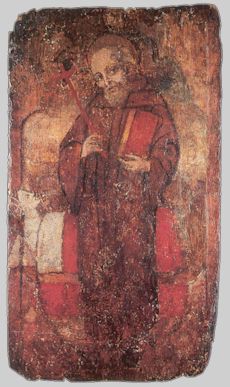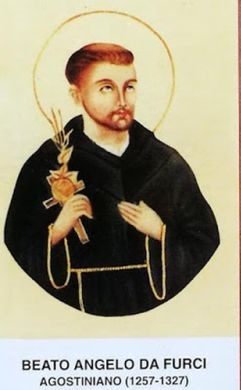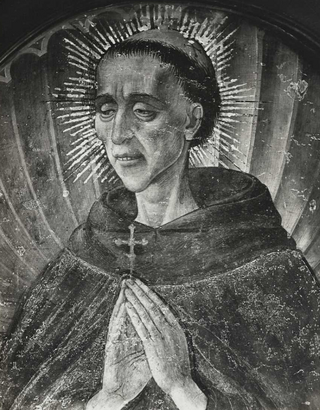Related Research Articles

Canonization is the declaration of a deceased person as an officially recognized saint, specifically, the official act of a Christian communion declaring a person worthy of public veneration and entering their name in the canon catalogue of saints, or authorized list of that communion's recognized saints.

Augustinians are members of several religious orders that follow the Rule of Saint Augustine, written in about 400 AD by Augustine of Hippo. There are two distinct types of Augustinians in Catholic religious orders dating back to the 12th–13th centuries:

Agostino Novello, also known as Augustine of Tarano, but born Matteo da Termini, was an Italian religious figure. He was born in the first half of the 13th century, at Termini Imerese, the village in Sicily from which he derived his surname. As that village was near Palermo, he is sometimes called Palermitano. The Augustinians believe he was probably born at Tarano. On entering religion he changed his name to Agostino, and later was given the additional name of Novello.

Silvestro Guzzolini was an Italian Catholic priest and the founder of the Silvestrini. He served as a canon in Osimo but respectful rebukes of his bishop's inappropriate conduct led him to leave for a hermitage before the bishop could strip him of his position. He remained in his hermitage with a determination to found a religious congregation and based it upon the Order of Saint Benedict after having a dream of Benedict of Nursia. His order received papal approval from Pope Innocent IV which allowed his order to expand across Italian cities to a significant degree.

Blessed Hemming of Turku was a Swedish Roman Catholic bishop and served as the Bishop of Turku from 1338 until 1366. He was born in Sweden though relocated to Finland following his appointment as bishop. He became a popular figure in the diocese for his staunch dedication to the educational and spiritual needs of the faithful. He was also a close friend of Saint Bridget of Sweden. During his studies he knew the future Pope Clement VI as one of his classmates.

Andrew of Montereale was an Italian Roman Catholic priest and a professed member of the Order of Saint Augustine. His life was devoted to teaching and leading the Augustinians from several positions of leadership; he was also hailed during his lifetime as a pious miracle worker.

Angelo Agostini Mazzinghi, O.Carm was an Italian Catholic priest and Carmelite friar. He was a noted preacher from Florence and was known for his pious devotion to the Carmelite Rule and to the spread of the gospel.

Angelo da Furci was an Italian Catholic priest and a professed member of the Order of Saint Augustine. He was a friend and student of Giles of Rome and served as Prior Provincial of the Abruzzi branch of the congregation.

Andrea Bertoni was an Italian Roman Catholic priest and a professed member of the Servite Order. Bertoni assumed the religious name of "Giacomo Filippo" upon being admitted to the Servites and he became the procurator of the convent he lived in from his appointment until his death.

Agostina Camozzi - in religious Cristina - was an Italian Roman Catholic professed religious from the Order of Saint Augustine. Camozzi led a dissolute life as a widow and a soldier's mistress before she became a nun and adopted a life of total repentance.

Ugolino da Gualdo Cattaneo was an Italian Roman Catholic professed religious and friar of the Order of Saint Augustine. Ugolino is best known for founding an Augustinian convent in Gualdo Cattaneo in 1258 where he served as its prior until his death. He practiced a rigorous spiritual life with austerities including frequent bouts of strict silence and fasting.

Francesco Lippi was an Italian Roman Catholic professed religious from the Carmelites. He lived his life as a soldier before suffering the loss of sight at which point his healing led him down the path of repentance and into the Carmelites.

Giacomo Bianconi was an Italian Roman Catholic priest and a professed member of the Order of Preachers. Bianconi - who hailed from Umbria - joined the order in his adolescence and dedicated his pastoral career to his flock and on one notable occasion aided refugees when Frederick II sacked the area in 1248. He also combatted heresies and managed to convert one of their chief propagators while also distinguishing himself through his life of extreme poorness that went past the Dominican standards.

Giovannangelo Porro was an Italian Roman Catholic priest and hermit who hailed from the Milanese region and was a professed member of the Servites. Porro was born to nobles and became a priest after the death of his father. He remained a hermit in convents in places such as Florence and Milan where he dedicated his life to inward meditation and self-mortification until his death.
Elena Valentinis was an Italian Roman Catholic professed religious from the tertiaries of the Order of Saint Augustine. Valentinis was born to nobles and married a knight during her adolescence while mothering six children before she was widowed in 1441. She soon became a professed religious and dedicated herself to austerities and a life of complete penance.

Dalmazio Moner was a Spanish Roman Catholic priest and a professed member of the Order of Preachers from Girona. Moner lived a humble life of solitude at his convent in Girona and later lived a period in France in a cave before being summoned back to Girona where he later died.

Gregorio Celli was an Italian priest of the Roman Catholic Church and a professed member of the Order of Saint Augustine. Celli lived with the latter order in Rimini until he decided to spend the remainder of his life in deep contemplation and so moved to the region's hills where he dwelled in a cave near the Franciscans stationed there. It is claimed he was expelled from his order and became a Franciscan though there is no evidence to support this claim.

Angelo of Foligno - born Angelo Conti - was an Italian Catholic priest and a professed friar of the Order of Saint Augustine. Conti was part of the order of John the Good though became a mainstream Augustinian in 1256 after the Grand Union of the order. He was a close friend of both Saint Nicholas of Tolentino and Blessed Ugolino da Gualdo Cattaneo.

Pietro Corradini was an Italian Roman Catholic priest and a professed member of the Order of Friars Minor. Corradini served in several leadership positions within his order which bought him into contact with the likes of James of the Marches and Camilla Battista da Varano - he was her confessor and spiritual director - while in turn being a well-known figure due to his mild mannered nature and for his preaching abilities.
References
- 1 2 3 "Blessed Clement of Osimo". All Saints & Martyrs. 2014. Retrieved 13 July 2016.
- 1 2 3 4 5 "Blessed Clement of Osimo". Midwest Augustinians. Retrieved 13 July 2016.
- 1 2 3 4 5 6 "Clement of Osimo - 01". Augnet. Archived from the original on 13 August 2016. Retrieved 13 July 2016.